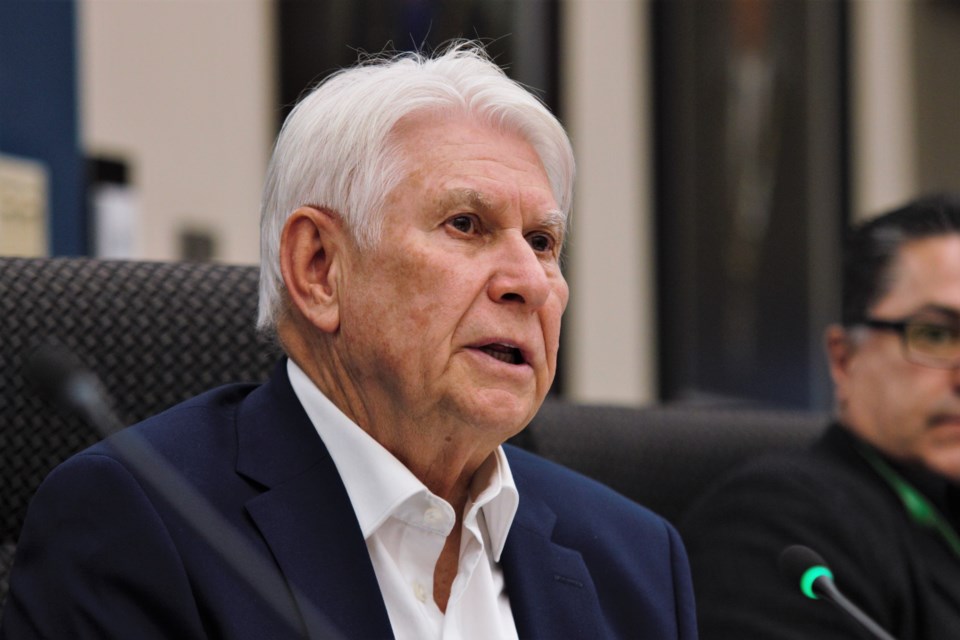THUNDER BAY — Local leaders have identified encouraging investments in the budget tabled by Ontario’s Progressive Conservative government on Thursday, but say they still have questions on how those will impact Northwestern Ontario.
Dinance Minister Peter Bethlenfalvy’s plan outlined $205 billion in spending this fiscal year, the most in the province’s history.
Thunder Bay-Atikokan MPP Kevin Holland, speaking to leaders at the Thunder Bay District Municipal League’s annual conference, said he didn’t yet have answers on how much of that will be spent in the region, and how.
He argued some new spending province-wide will clearly benefit regional residents, adding his job will be to advocate for the region’s needs as spending decisions are made in the coming months.
Thunder Bay-Superior North MPP Lise Vaugeois said there were some clear positives in the budget, including the expansion of the “learn and stay” grant for health care workers, and funding to create a joint veterinary program between Lakehead and Guelph universities.
“Farmers have been asking for that — they need help with large animal welfare. That’s a positive, so I was really happy to see that,” Vaugeois said.
She also welcomed new funding for supportive housing, but said the budget falls flat on housing more broadly.
“We know housing across the region is a huge issue. We can’t bring professionals into our communities, we can’t bring nurses, we’re having trouble keeping educators, because there’s no housing,” she said.
“Well, the overall budget for housing and municipal affairs is being cut by $124 million.”
Vaugeois also raised concerns over billions of dollars the government has previously budgeted in areas like health care and education, but never spent.
“The result is a repair backlog in schools, there are not enough [educational assistants], there are not enough teachers. In the hospitals, we’ve lost an incredible number of experienced health care workers, because they’re not being paid well enough.”
At the conference, Holland addressed concerns over highway safety, acknowledging the recent death of a snowplow operator in a collision on Highway 11/17 near Ignace.
“The last week-and-a-half has seen some tragic accidents on Northwestern Ontario highways,” he said. “I’m not going to avoid that elephant in the room.”
“We’re going to do everything we can to work toward avoiding these types of accidents.”
Holland pointed to the government’s recent move to tighten snow clearing standards on Highways 11 and 17, requiring contractors to clear them to bare pavement in 12 hours.
Holland defended Northern Ontario highway standards, calling them “nation-leading” — but acknowledged many municipal leaders in the region would disagree.
“Our government is aware of the calls to match Northwestern Ontario standards to that of the 400-series highways in Southern Ontario, but it’s not practical,” he said.
“I know, I can read the minds of people in the room, and that’s fine,” he added in his speech to the municipal leaders, referencing his own history advocating for highway safety improvements as longtime mayor of Conmee.
Shuniah Mayor Wendy Landry was glad to see widening of Highway 11/17 between Thunder Bay and Nipigon specifically mentioned in the budget.
Like with new mental health and addictions funding, however, she’s still looking for details on how highway dollars will impact the region.
“[It’s] a lot of money, but it doesn’t specifically say with our highways in Northwestern Ontario how much of that is coming here," Landry said. "The twinning of the highway is going to continue, so we’re happy to see that.”
Vaugeois said the government must do more, reiterating her call for the province to regulate driver training.
“We know drivers are showing up on the road who can’t back up a truck, who don’t know how to drive standard. There are a lot of things going on, and government absolutely needs to step in, regulate that industry, regulate the schools.”
Holland has responded that “the solution is not as easy as what the opposition may suggest,” saying Ontario can only regulate drivers trained here, and consistent federal standards are needed.
On funding for mental health, addictions, and homelessness, Holland said the government was continuing to ramp up funding.
He pointed to budget commitments of $425 million in new funds over three years to support mental health and addictions services, and a yearly $202 million increase to the Homelessness Prevention Program and Indigenous Supportive Housing Program.
He said he’d been questioned by Landry on how that would benefit the region, but couldn’t yet give a definitive answer.
“I can’t tell you how much of that is going to be coming [here],” he said. “It’s my job to make sure those dollars are coming to Northwestern Ontario. The government knows we have a higher rate [of opioid poisonings], and we’re going to be advocating for those funds we need.”
In an interview, Mayor Ken Boshcoff said he was generally pleased with the budget on first inspection, highlighting new investments in health care staffing, mental health and addictions, and home care.
While calling it a “broad brush” budget with few specific references to the region, he called that a minor concern.
“Personally, I’m not disappointed, because the issues of our region are being addressed,” he said. “They’ve got a billion dollars for home care — that affects us, and we’re beneficiaries. So we can’t be too critical — it is a budget, not an itemized shopping list that each of the 444 municipalities submit.”
Boshcoff called funding to support the mining industry, including an expansion of $13 million a year for the Ontario Junior Exploration Program, a standout.
“For us, the clincher is advancing the critical mineral exploration. They’ve come to the table with some money to get these junior mining companies financed, so we can accelerate the exploration and the development.”
At the conference, Holland said he's optimistic that spending can help not just expand the region's mining industry, but support processing of minerals in Thunder Bay — something Boshcoff said the city is well-positioned to support.
With files from Matt Vis
